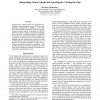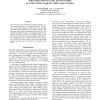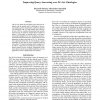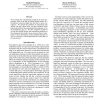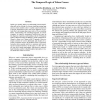129
click to vote
KR
2010
Springer
14 years 12 months ago
2010
Springer
Measuring the inconsistency degree of a knowledge base can help us to deal with inconsistencies. Several inconsistency measures have been given under different multi-valued semant...
142
click to vote
KR
2010
Springer
14 years 12 months ago
2010
Springer
In this paper, we propose a progression semantics for firstorder answer set programs. Based on this new semantics, we are able to define the notion of boundedness for answer set p...
119
click to vote
KR
2010
Springer
15 years 4 months ago
2010
Springer
We study logical principles connecting two relations: independence, which is known as nondeducibility in the study of information flow, and functional dependence. Two different e...
165
click to vote
KR
2010
Springer
15 years 4 months ago
2010
Springer
Existing action calculi provide rich, declarative formalisms for reasoning about actions. BDI-based programming languages like AgentSpeak, on the other hand, are procedural and ge...
129
click to vote
KR
2010
Springer
15 years 6 months ago
2010
Springer
We investigate a class of first-order temporal epistemic logics for the specification of multi-agent systems. We consider well-known properties of multi-agent systems including ...
153
click to vote
KR
2010
Springer
15 years 6 months ago
2010
Springer
The DL-Lite family of Description Logics has been designed with the specific goal of allowing for answering complex queries (in particular, conjunctive queries) over ontologies w...
138
click to vote
KR
2010
Springer
15 years 6 months ago
2010
Springer
We investigate the computational complexity of axiom pinpointing, which is the task of finding minimal subsets of a Description Logic knowledge base that have a given consequence...
137
click to vote
KR
2010
Springer
2010
Springer
Repair and Prediction (under Inconsistency) in Large Biological Networks with Answer Set Programming
15 years 6 months ago
We address the problem of repairing large-scale biological networks and corresponding yet often discrepant measurements in order to predict unobserved variations. To this end, we ...
141
click to vote
KR
2010
Springer
15 years 6 months ago
2010
Springer
While type causality helps us to understand general relationships such as the etiology of a disease (smoking causing lung cancer), token causality aims to explain causal connectio...

